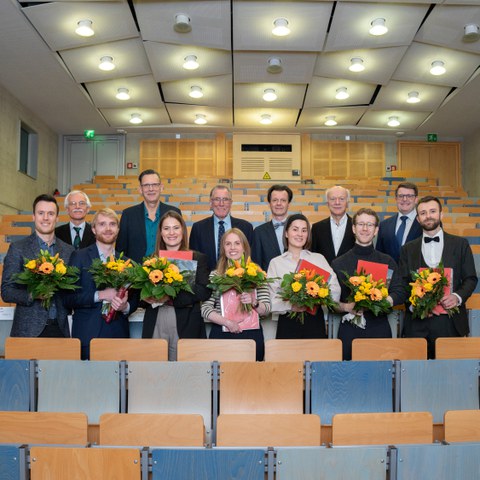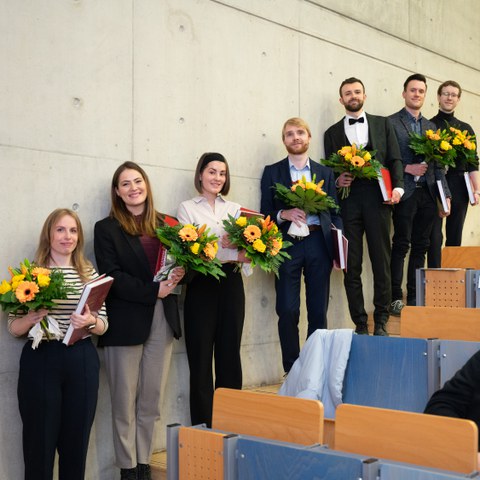Jan 29, 2025
Awarded: Seven young researchers receive Carl Gustav Carus Award

Top row (from left to right): Prof. Andreas Deußen, Prof. Frank Buchholz, Dr. Sperl, Janko Haft, Prof. Dr. Ehninger, Joachim Hoof. Bottom row (from left to right): Felix Broghammer, Dr. Jan Fischer, PhD Milica Jelicic, Sarah Rösing, Dr. Julia Helene Grundmann, Dr. Maximilian Werner, Dr. Iñaki Schniewind.
Cancer medicine, radiotherapy and molecular genetics - seven young researchers from Dresden University Medicine will receive the Carl Gustav Carus Advancement Award 2024 on 28 January for their outstanding research work and publications on these topics. Graduates who have completed a doctorate with the distinction “summa cum laude” or “magna cum laude” can apply for the “Advancement Award for Outstanding Doctorates”. The doctoral prizes have been awarded since 1998 and the publication prize since 2003. This year's seven prizewinners include researchers from the clinical, experimental-theoretical and experimental-scientific fields.
“Innovative, curious and hard-working - the young scientists at the Dresden University Medicine campus have everything it takes to conduct successful research. They are as diverse as they are focused in their choice of topics,” says Prof. Esther Troost, Dean of the Faculty of Medicine at TU Dresden.
“Every year, the budding doctors from Dresden show anew how committed they are to pursuing open research questions. The results have a significant influence on modern diagnostics and therapy,” adds Prof. Uwe Platzbecker, Medical Director at Dresden University Hospital.
In the clinical field, Maximilian Werner investigated whether and to what extent personalized therapy trials are superior to classic, guideline-based therapy in so-called CUP syndrome. CUP syndrome refers to tumors in which metastases but no primary tumor can be found. The death rate has been very high to date.
This year, two awards on very different questions go to the experimental-theoretical field. Iñaki Schniewind analyzed the effects of proton therapy in a study. The parameters investigated included the survival rate of tumour stem cells, the duration and extent of DNA damage and a characterization of epigenetic effects. The background to this is that radiotherapy with protons allows a more precise dose application compared to photons, but the biological effects have hardly been investigated to date.
Jan Fischer worked on the development of an experiment to demonstrate the importance of a gene for the enlargement and folding of the cerebral cortex in primates. For obvious ethical reasons, a particularly gentle procedure had to be developed here.
Julia Helene Grundmann's doctorate focuses on modern diagnostics and therapy for caries diseases. A differentiated assessment of the lesion is essential for the appropriate therapeutic approach. Grundmann tested various optical procedures to determine whether they allow the differentiation of hidden caries and can therefore provide an important decision-making aid.
In the experimental science field, Milica Jelicic receives an award for her work on the application of site-specific recombinases. The targeted evolution strategy she has developed expands the molecular toolbox, reduces the cytotoxicity of the intervention and helps to develop more precise procedures in genome surgery.
The publication prizes go to Felix Broghammer for his research into new potential treatment approaches for squamous cell carcinomas in the head and neck area, and Sarah Rösing, who was the first to reveal the detailed course of the disease in myotonic dystrophy, the most common form of muscular dystrophy.
“Outstanding research must be promoted. As the University Medicine Foundation, we are delighted to be able to make a contribution to this again this year and to recognize the outstanding dissertations and scientific publications in this way. Our thanks go above all to our long-standing partner, the Ostsächsische Sparkasse Dresden, which supports this cause together with us,” says Prof. Andreas Deußen, Member of the Board of the University Medicine Foundation.
At the ceremony, the prizewinners were honored by representatives of the Foundation, Dresden University Hospital and the Faculty of Medicine at TU Dresden, as well as Ostsächsische Sparkasse, which donated the prize money. The publication prize and the sponsorship prizes for an outstanding doctorate are each endowed with up to 1,000 euros.
In Saxony, more than 1,200 people successfully completed their doctorate in 2023. Over 12,700 people were in an ongoing doctoral process. Almost a third of all doctoral candidates are aiming for a doctorate in the field of human medicine and health sciences, and the proportion of women is over 63%. At the Carl Gustav Carus Faculty of Medicine at TU Dresden, there were a total of 281 completed doctoral procedures in 2023. The proportion of women here is just under 67 percent.
Award winners at a glance:
Dr. med. Maximilian Werner: „Untersuchung genetischer und epigenetischer Alterationen sowie daraus abgeleiteter personalisierter Therapievorschläge beim CUP-Syndrom“
Dr. med. Iñaki Schneidewind: „Cellular Plasticity Upon Proton Irradiation Determines Tumor Cell Radiosensitivity“
Dr. med. Jan Fischer: „Exploring the function of human-specific ARHGAP11B in chimpanzee and human brain organoids“
Dr. med. dent. Julia Helene Grundmann: „Polarimetric examination of carious lesions – Visualization and characterization of occlusal carious lesions using optical imaging techniques in-vitro“
Dr. Milica Jelicic: „Discovery and Evolution of Cre-Type Site-Specific Recombinases for Advanced Genome Engineering“
Felix Broghammer: „Resistance of HNSCC cell models to pan-FGFR inhibition depends on the EMT phenotype associating with clinical outcome“
Sarah Rösing: „Chronic endoplasmic reticulum stress in myotonic dystrophy type 2 promotes autoimmunity via mitochondrial DNA release”
Contact:
Anne-Stephanie Vetter
Staff Unit Public Relations of Carl Gustav Carus Faculty of Medicine
at TUD Dresden University of Technology
National Center for Tumor Diseases (NCT/UCC) Dresden
+49 (0) 351 458 17903

